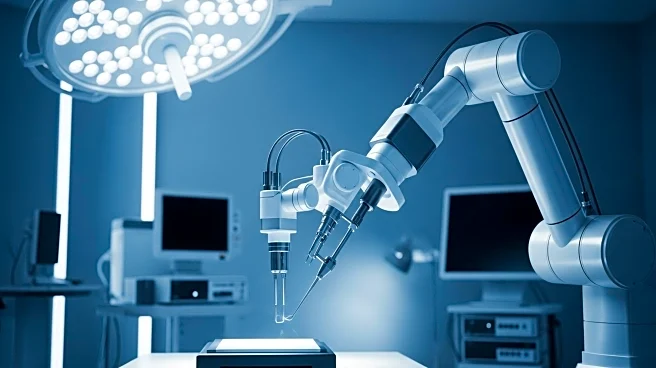What's Happening?
EndoQuest Robotics Inc. has announced a significant achievement in the field of therapeutic endoscopy with the successful completion of a robotic endoscopic submucosal dissection (ESD) at the Mayo Clinic. This procedure was part of the Prospective Assessment of a Robotic Assisted Device in Gastrointestinal Medicine (PARADIGM) Trial, which aims to evaluate the company's Endoluminal Surgical System for lower gastrointestinal procedures. Dr. Norio Fukami, a professor of medicine and director of Therapeutic Endoscopy at Mayo Clinic in Arizona, performed the procedure to remove a complex colorectal lesion. The trial is conducted under a U.S. Food and Drug Administration (FDA) Investigational Device Exemption (IDE) pivotal trial. The ESD procedure is noted for its potential to reduce the need for invasive surgeries, offering a less burdensome option for patients and physicians.
Why It's Important?
The successful robotic ESD procedure marks a pivotal advancement in gastrointestinal medicine, potentially transforming how complex endoluminal therapies are performed. This development is significant as it could lead to a reduction in invasive surgeries, such as colectomies, thereby decreasing patient recovery times and healthcare costs. The technology also addresses the steep learning curve associated with traditional endoscopic procedures, making it more accessible to practitioners. As therapeutic endoscopy is one of the fastest-growing areas in medicine, this innovation could drive a shift towards more organ-sparing treatments, benefiting both patients and healthcare providers by improving outcomes and efficiency.
What's Next?
The PARADIGM Trial will continue to enroll 50 subjects across five leading U.S. healthcare institutions, including Brigham and Women’s Hospital and Cleveland Clinic. Upon completion, EndoQuest Robotics plans to submit a De Novo request for FDA authorization to market the Endoluminal Surgical System in the U.S. The company recently secured additional funding to support the advancement of its surgical platform, indicating a strong commitment to bringing this technology to market. The trial's outcomes could influence future regulatory approvals and the adoption of robotic-assisted procedures in gastrointestinal medicine.
Beyond the Headlines
The introduction of robotic-assisted ESD procedures could have broader implications for the medical field, including ethical considerations around the use of robotics in surgery and the potential for job displacement among traditional surgical roles. Additionally, the success of such technologies may prompt further investment in robotic systems, spurring innovation and competition in the medical device industry. Long-term, this could lead to a reevaluation of surgical training programs to incorporate robotic techniques, ensuring that new generations of surgeons are equipped with the skills needed for these advanced procedures.









